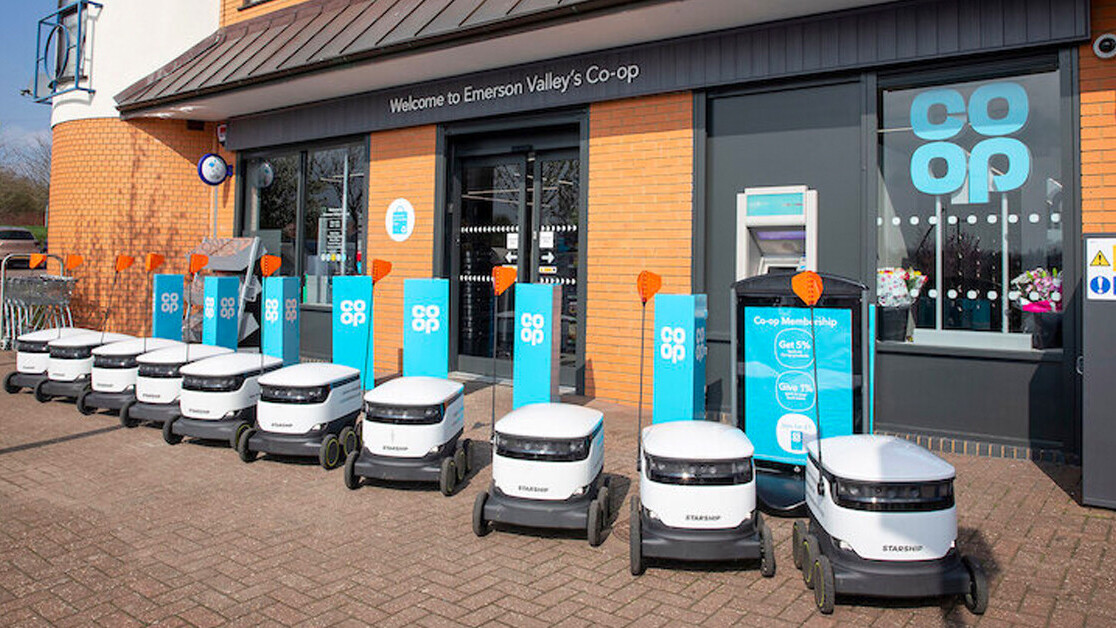This article was originally published by Sarah Wray on Cities Today, the leading news platform on urban mobility and innovation, reaching an international audience of city leaders. For the latest updates follow Cities Today on Twitter, Facebook, LinkedIn, Instagram, and YouTube, or sign up for Cities Today News.
UK supermarket Co-op has expanded its use of Starship Technologies’ autonomous home delivery robots to the town of Northampton. More deployments are expected in additional towns and cities soon.
Northampton is the Co-op’s second Starship robot delivery location after Milton Keynes, where the service launched in 2018 and is available from eight stores. The retailer plans to use up to 300 of Starship’s robots in the UK by the end of 2021.
The robots in Northampton will serve around 5,000 households with contactless deliveries from the Co-op food store in Wootton Fields initially. The delivery devices will travel up to three miles from the shop, with bookings made through the Starship Food Delivery app.
The battery-powered robots use a combination of sensors, artificial intelligence, and machine learning to travel on pavements and navigate around any obstacles. Computer vision-based navigation helps the robots to map their environment to the nearest inch.
[Read: ]
Delivery boom
Like many other retailers, Co-op has ramped up its online offer to meet demand, particularly during the pandemic. It aims to offer online home delivery and click and collect, through its own site and with partners, at over 1,000 stores by the end of this year. This is up from the 650 it had originally planned.
The company says it sees its stores as “micro-distribution hubs,” with orders picked from local Co-op stores so high street stores benefit from any increase in online demand.
Starship Technologies’ robots have completed over 500,000 commercial autonomous deliveries in local neighborhoods and university campuses across five countries, traveling over one million autonomous miles in total, the company said. A statement added that delivery numbers for Co-op products have tripled in Milton Keynes during the Covid-19 crisis.
Rules of the pavement
A Starship spokesperson told Cities Today: “The pandemic has accelerated our growth, and we’ll be expanding into new towns and cities soon.”
They said that where their services run: “We have agreements in place with local governments to operate our robots.”
Robot deliveries are also being piloted elsewhere. In July, Amazon announced trials of its electric, autonomous Scout package delivery robots in Atlanta, Georgia, and Franklin, Tennessee, adding to services in Snohomish County, Washington, and Irvine, California. For most cities, though, this is still an emerging area, and with street and pavement space at a premium, leaders will be keen to avoid the disruption seen around the world in the early days of micromobility.
In July, Eric Stuckey, City Administrator, City of Franklin, told Cities Today that the Amazon pilot would start small and allow the city to “go to school” and learn what regulations might work best if the system were to be scaled up.
In 2017, San Francisco, which was a front-runner for these services, passed regulations to govern the use of delivery robots after complaints from some residents. The city has since established an Office of Emerging Technology to engage earlier with companies that want to deploy innovative new systems and products – the home page features an image of a delivery robot.
In other robot uses, Singapore piloted a four-legged, dog-like robot called Spot to promote social distancing in parks, and Seoul is using small humanoid robots to deliver digital skills training to senior citizens.

SHIFT is brought to you by Polestar. It’s time to accelerate the shift to sustainable mobility. That is why Polestar combines electric driving with cutting-edge design and thrilling performance. Find out how.
Get the TNW newsletter
Get the most important tech news in your inbox each week.





